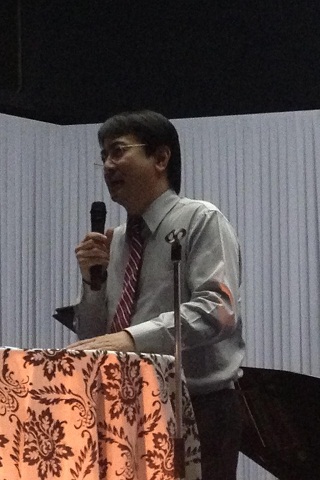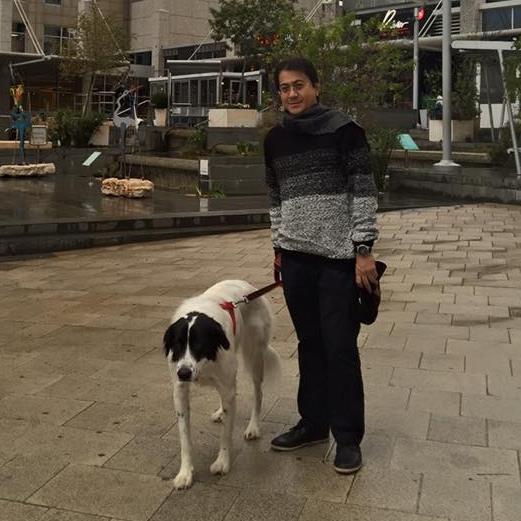Poet and ambassador Neal Imperial: Between solitude and solidarity
It is hard enough to be a diplomat in these interesting times of people contradicting each other with harsh, ugly words, let alone be a poet who must navigate these contradictions using refined, beautiful language. But Neal Imperial is both, and he applies himself to contradictions with great talent and dignity.

During college at the Ateneo de Manila, Imperial wrote poems and edited a literary journal. After graduating with a degree in Political Economics, he took his Master of Arts in International Studies at the University of the Philippines. Then he took the Foreign Service Office examinations, one of the most difficult examinations for public service. His first diplomatic assignment at the Department of Foreign Affairs was to Indonesia in 1997. He has since been our diplomat to Canada and Singapore. In 2014, he was appointed our ambassador to Israel, where he is serving now.
His first book of poetry, Salimbayan, was co-authored with fellow Atenean poets Jim Pascual Agustin and Argee Guevarra during their college days in the 1990s. His second book and first solo poetry anthology, Silver Fish, Hook Of Moon, was published by UST Publishing in 2012. He is currently at work on an anthology of poems by Filipino diplomats, the first of its kind in the Philippines.
Read: Book review: Temperance in Neal Imperial’s ‘Silver Fish, Hook of Moon’
GMA News Online: How is the new book coming along?
Neal Imperial: I am working on an anthology of poems by Filipino diplomats, which will be the first of its kind in the Philippines. I found out that in its more than 100-year history, the DFA has produced a number of distinguished poets: Jose Garcia Villa, Claro M. Recto (who wrote in Spanish), Virginia Moreno, Ambassador Manuel Viray (+), Amb. Edmundo Libid (+), Amb. Vicente “Butch” Bandillo, Amb. Al Vicente (ret.), President Diosdado Macapagal (in Kapampangan), just to name a few. All of them were either foreign service officers or worked in the foreign service, loyally serving the two jealous Muses of patria and poesia. I am in the process of selecting the poems and seeking permission to publish them.
The fact that the DFA, like its Russian and Latin American counterparts, has consistently produced diplomats who are not merely bureaucrats, but also men and women of letters is a source of Pinoy pride.
Who are your major writing influences?
Many of them are Filipino poets, but also poets from Latin America and Europe: Dr. Bienvenido Lumbera, Rolando Tinio, Oscar de Zuniga, Amado V. Hernandez, Rio Alma, Eman Lacaba, Pete Lacaba, Emmanuel Torres, Ricardo de Ungria, Gemino Abad, Alfredo Yuson, Danton Remoto; Neruda certainly, Lorca, and Andrei Voznesensky.
Who are you reading now?
I read several books at a time, combining light and not-so-light reading.
Prose: Start-Up Nation by Dan Senor and Saul Singer; The Devil’s Dictionary by Ambrose Bierce; and A Student’s Guide to Intellectual Work by Jean Guiton, which has been a constant reading companion to me as a writer.
Poetry: Jim Agustin’s Alien to Any Skin and Teddy Espela’s soon-to-be-published manuscript.
And a screenplay written by Khavn dela Cruz for his latest film.
Are your books available in brick-and-mortar stores in Israel, where you are currently serving?
Unfortunately, my books are only available in Philippine bookstores, if there are still any left. Some were sold in Singapore for a time. Philippine publishers, I think, should embrace e-commerce and sell books online more aggressively, to reach a much wider audience.
Our country is a fountainhead of the creative arts in Asia. I fail to see why our writers are not being read in the literary centers of the world given the high quality of writing in English in the Philippines.
Do you know of any other Filipino writers who have lived and published there in the past?
The late Philippine Ambassador to Israel Antonio Modena was a respected journalist who wrote news articles and opinion pieces, but not “literary” essays.
Does the homeland look clearer and dearer from a distance? Is this true in your case?

Expatriation has a way of making the overseas Filipino appreciate his/her roots and culture more. I experienced this when I was posted in Singapore and Vancouver for many years.
But my experience in the Holy Land is different, mainly because of my religious connection to the holy sites in Israel. So, instead of disconnection, there is growing spiritual rootedness, a strong re-connection if you will, to the soil of our soul.
Have you had the opportunity to meet members of the Israeli literary community? What are their curiosities about the Filipino writer, and what are yours about the Israeli writer?
Sadly not yet. But I intend to reach out to them very soon. Thank you for reminding me.
Early in your career, you co-wrote an anti-Marcos satirical play (Gomburza Ngayon). With whom did you write this play?
Yes, I remember writing the first draft without sleeping for two days way back in 1985, when I was still in high school. Back then, I considered it as my contribution to the struggle against injustice during the dark days of authoritarian rule in our country. My co-writers Vicente “Enteng” Reyes and Francis Sadac added important segments and improved the original play, helping us win in the one-act play competition in Ateneo. When it was performed, the play had a powerful effect on the audience because of the highly politicized milieu at the time. Many were moved to tears and anger.
Still on this play you wrote: did the play reflect your political views back then? Do you still hold the same political views you did when you were younger? If not, how has it changed through the years, and what contributed to the change?
During those formative years, my classmates and I were reading Renato Constantino’s nationalist writings; and we devoured the “underground” literature in Malaya, We Forum and Mr and Ms, which greatly influenced the social realist perspective of the play. Our real political awakening, however, came when we campaigned for the candidacy of Cory Aquino and joined the 1986 EDSA People Power Revolution. Suddenly, we were no longer mere bystanders or armchair activists but agents of political and social change.
Despite being in government, I still have the same socially oriented perspectives and beliefs even though my stand on specific issues may have changed. What counts is one’s overall orientation in life and this will always be reflected in my writing.
Your daughter Gabrielle must be in her teens now? Is she a writer and poet too like her dad?
I wish, but she has her own interests and personality as a millennial. Maybe in the future, she might find the right path to creative writing. I am eagerly waiting for a miracle to happen.
Tell us more about the bilingual concept of your book Silver Fish, Hook of Moon.
As Professor Emmanuel Eric Torres points out in his introduction to the book, the poems in Filipino are not translations of the English ones. The poems, in either language, are interspersed following the meta-flow of the entire collection.
In poetry, I strive for classic simplicity, to lay bare the pure emotion, imagery or thought each poem seeks to distil, shorn of effusive language or pedantry that may distract the reader from the poetic moment. Being a product of a bilingual environment, the choice of language is natural for me; the poem reveals itself or is wrought from the right language, or else it fails to find its true expression.
I am very pleased that the book was chosen as a finalist in both the 2013 National Book Award for poetry in English and the Madrigal-Gonzales First Book Award despite being a hybrid (there is no category for bilingual literature in the awards).
Given the unflattering perception foreigners are having about our current government, how are you coping as a diplomat serving in these interesting times?
I think we should focus on what is positive and essential in the policy thrust of the new administration, such as its seriousness in pursuing an independent foreign policy. The Philippine president is even admired for his strong political will and convictions. Focusing on these things helps our job become easier.
Do you feel more compelled than ever to confront the political issues you are dealing with through poetry and other literary forms? Or are you keeping your political views separate from your personal ones at this point?
The poet should not separate his political and ethical views from his writing. But then we do not need to publish everything we write, do we? And if we are compelled to publish, we need not do so immediately. Sometimes it suffices to simply express ourselves quietly, to sharpen our senses and purify the soul, or assuage the conscience.
In the words of Pablo Neruda, “A poet must achieve a balance between solitude and solidarity, between feeling and action, between intimacy of mankind and the revelation of nature.” — BM, GMA News




